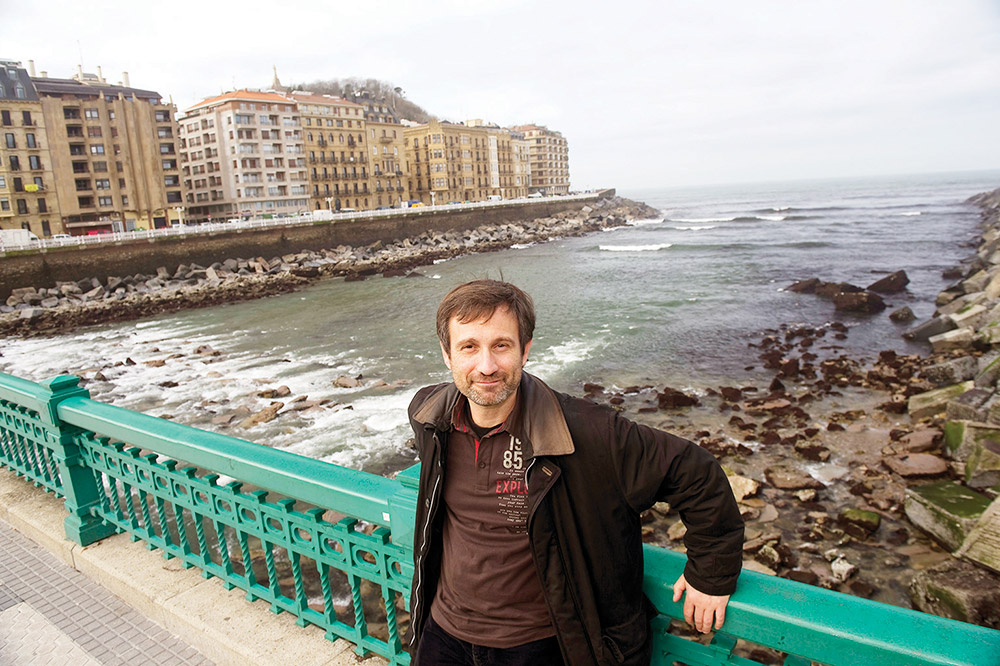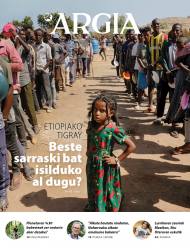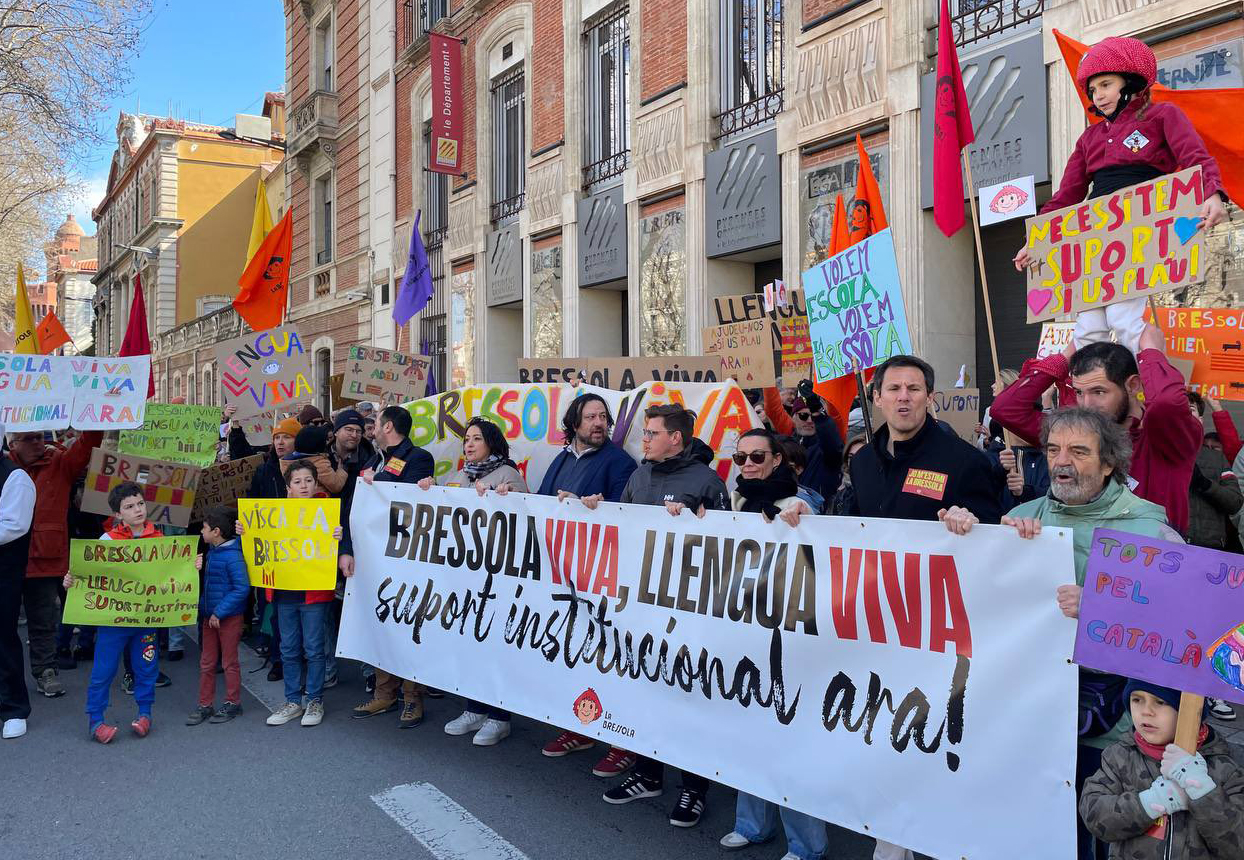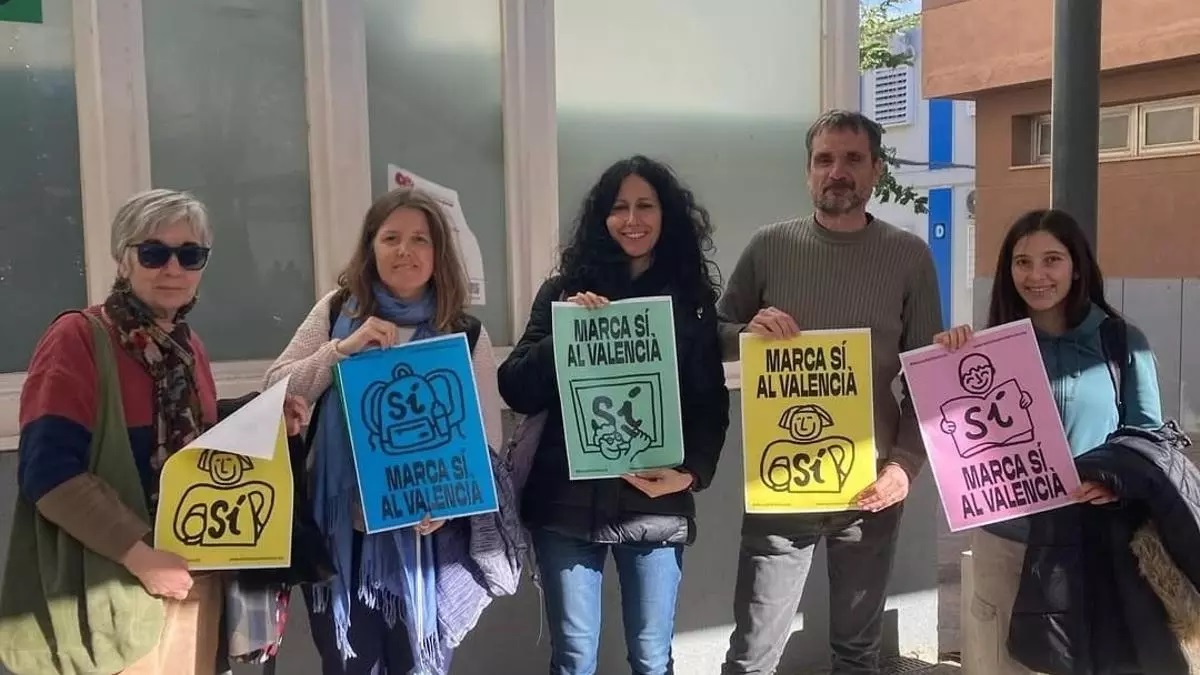"We must let the label ‘Bilingualism’ rest because it hurts us."
- Francesc Xavier Vila (Esplugues de Llobregat, 1966) is the new Secretary of Language Policy, under the Department of Culture. Vila replaces Esther Franquesa and the former DG becomes secretariat. The purpose of the amendment is to show the "renewed importance to be given to the language" and to facilitate transversality, since "the secretary has greater capacity to interact with other departments". This interview was edited by Vilaweb and we have brought it thanks to the Creative Commons license. The original dialogue is Catalan and is longer. In this link you have the original.

What critical analysis does it make of the previous mandate?
It is not just a question of talking about the previous mandate. There are more prospects. After the linguistic policies of the centuries, although the 78 regime is not ideal, it allows for recovery policies. In some ways, the majority of Catalan society agreed. The first thing that was intended was for all citizens to have knowledge of Catalan, little by little but with great intensity. Secondly, that Catalan should be a common language for all areas of communication. There were divergences: some wanted more superiority and others wanted less. But everybody believed that it had to be used in everything. And thirdly, we didn't want to close communities. The population from abroad should be integrated into a single national community.
And what happened?
They were minimal agreements, if you like, but indirect ones. In 78, or 83, they all signed it. Decades later, we still have a large number of people who do not know the language, Catalan is not used in all areas and there are symptoms of segmentation and polarization. Much of the population has not considered Catalan as their language. The context has changed, I do not mean that everything has gone wrong. In a short time we received over 1,700,000 people and we did not plan to do so. But we have not made the necessary policies to get these people involved in the regular use of language. We have not managed to get everyone to know. And we've gone back in some ways. Because there are those who believe that they have the right to live without regard to Catalan. We need to rebuild consensus and ambitious and achievable goals.
Why have we not achieved this?
In the last decade, we have collectively been concerned about language in the background. Priority has also been given to the Catalan language sectors. We have often been discussing what we had to talk about for the future, but that has not allowed us to put ourselves on the table that we were not meeting the fundamental challenges. There is another question, not only of the general direction, but also of linguistic Catalanism and movements related to the defence of the language. We have changed the areas of discourse and analysis, which so far have always been far from the need for standardisation and linguistic recovery. And we've often been led to debates that had no benefits.
"Decades later, we still have a large group of people who don't know the language."
Does it have to do with the political component of the breakdown of consensus?
Well, before I say that consensus has been broken, I would say that the objectives of the basic consensus have not been met. I believe that these consensuses are still fundamentally dominant, but we do not remember either. We have recognised that in Catalonia there may be hundreds of thousands of people who do not understand the language of the country. We have recognised that nothing happens if all the workers in a company do not understand Catalan. If we rethink the speeches, we will be able to re-emerge the consensus and move forward very positively.
I would like to say that we have come from a political cycle in which things have been seen that so far have not been seen with language. Many groups in Parliament in the use of Spanish.
It's a very funny contradiction. People proudly speak Spanish for people who do not understand Catalan as their own language. See, as for the number of speakers, Catalan is a medium grade language. The Catalans will be multilingual from now on: we will have to know more than one language. We must guarantee Catalan in its territory exclusive functions. The preferential use of Catalan in Parliament made it clear that Catalan was one of all. Maybe I'm old, but I remember the slogan that said, "Catalan is everyone's thing," a consensus that worked for a long time. It has not been completely lost, but it is weakened. We should recover it.
Has linguistic immersion been accomplished?
Compared to the rest of the Catalan countries, the results we obtain in Catalonia are better. Does it mean that we are in the best position? No, we're far away. A part of the population acquires a weak knowledge of the language, which is more receptive than the user language. We've become perverse in dynamics. It's often said that you know it, but you don't use it. The use of language is not decided as if you were choosing a soda. No, what often happens is that the school provides Catalan knowledge, but does not color it sufficiently. You can't give all the records. And this is an additional job for the Catalan school. A German school is not required. But our school has to give more language tools than a normal school. We're not doing it. In recent decades, in many ways, it has ceased to be alert.
The last judgment of the Supreme Court and the law of Celah seriously harm Catalan. Any class can pursue core subjects in Spanish, and a future Spanish government can impose the percentage in a general way.
Right now the Supreme Court is considering the judgment and when it replies it will have the corresponding reactions. I – I am not a lawyer – and many jurists have been surprised that the courts have assumed competences that are not theirs. The Court can tell the executive or legislator that they must respect those rights, but it cannot say exactly how they should do so. It is surprising that the court decides that it is 25%. 25% Why? And how do you count? The judges have gotten into the field that they didn't have to be. But it is what the judiciary of the Spanish State is like.

How can the use of Catalan among young people affect this situation? In fact, it is one of the age ranges in which use is most reduced.
It's not so clear that it's one of the lower sections. If we talk about the original language of the speakers, it's not true. There are more young people with a Catalan language of origin than young adults. Because there is more immigration among young adults, coming to work, than among young people. But young people mix with more people. They have many more relationships between them, comparing those of adults. And in interpersonal relationships, it's not clear that the behaviors of today's young people are very different from those of earlier generations. However, by coinciding the use of Catalan and Spanish in the dependence of Spanish, if you have more relationships you may be with people who do not speak Catalan and, therefore, speak Spanish. But be careful that young people are guilty. There's a mirage.
What?
People over 60 years of age routinely compare current young people (36% have Catalan as their native language) with young people of their time (more than 50%). It's a trap. You can't directly compare the population that's demographically weaker to the population that's 40 years ago. The tests should be very fine. I would like young people not to repeat that topic that Catalan is leaving. Because we don't have data to say that young people are leaving Catalan. I would like there to be many more new speakers among young people. That's where we should come together.
Does the bilingualism that currently works in Catalan society condemn Catalan to the process of substitution?
Aracile [Lluís Vicent Aracil i Bonet, Valencian sociolinguist] said in the 1960s: "Bilingualism is used as a myth to hide substitution, because only some of us are bilingual and others are not." I remember it, because we often lose ourselves in conceptual debates that don't allow us to see reality. Bilingualism, if it doesn't have adjectives, has so many meanings that it doesn't mean anything. We can say that Catalonia is a bilingual society. But I remember that Madrid held a conference called "Madrid, bilingual community," where it was proud to do a lot of things in English. We lose in nominalist debates about more bilingualism and less bilingualism, and we give the label to people who can interpret bilingualism as "seskilinguism": you have an obligation to be bilingual, I want to be monolingual, and you always have to give in to me. It is a fraud. If you accept that that's a bilingualism, you've been robbed of your wallet.
"Some believe they have the right to live without taking into account Catalan"
And then?
Bilingualism and multilingualism are unstable tools of very difficult handling. Nobody questions that. What we have to achieve is that the Catalans, whose majority wants to be multilingual, do not turn multilingualism into a weapon of deactivation of Catalan. I like the label of self-centred multilingualism. Or, if you like, the principle of linguistic subsidiarity: do not lingua franca what you do in the local language. In general, does bilingualism punish languages? No. Because, look what a paradox, while there's bilingualism, the two languages are used. But the term bilingualism hurts us, because it has connotation and leads to simplistic speeches. Let us rest quietly and pave the way for self-centred multilingualism that guarantees the sustainability of the country’s own languages and the knowledge of common languages.
What do you think about this concept that Professor Josep Murgades has called 'linguistic panxacontentisme'?
It's all about perspective. Most speakers in most languages around the world care little about their language. Communities that are in a rigorous process of linguistic substitution also don't think about their languages. Fortunately, there are many people here who are concerned about the situation in Catalan. Probably, here we have less 'sweets' than in other societies with threatened languages. It's a non-empathetic, domestic word. I don't think it has a scientific or political track record.
If I am not going to tell you. How to solve the dichotomy between warning the evil state of the Catalan and not turning the Catalan into the cause of the Martian?
I very much liked the approach. That is what must be achieved. Now you have to organize the world linguistically. And it can do it in many ways. For he can say: I, anywhere, with my language, in any place have to serve me as if I were in my hometown. I believe that this is not the way to democratic and egalitarian coexistence. It's necessarily conflicting. I like the model proposed by Professor Van Parijs.
What does he say?
That all languages need a territory that is the main language, where certain functions are guaranteed, where they are the host languages, where, if you want to be part of that group, it is worth learning. This is not contradictory to multilingualism. But would we agree to be able to live the same in English in Paris and in London? I do not think it is fair. Because it puts the whole of French society at the service of the monolingual privilege of English-speakers. It's a global problem, and let's see how we fix it. The Van Parijs model says that we are all multilingual, but at the same time we maintain the priority of each language in its territory. Does that exclude other languages? No. This means that someone who moves here cannot leave the country’s own language without limits.
Milatik gora lagun bildu ziren larunbatean Ipar Kataluniako Perpinya herrian La Bressola ikastetxeak defendatzeko. Murgiltze eredua katalanez eskaintzen duten ikastetxe horiek arrazoi ekonomikoengatik larrialdian daudela adierazi dute eta erakunde publikoei eskatu diete babes... [+]
Lagun asko sumatu dut kezkatuta euskaldun gero eta gutxiagok ahoskatzen duelako elle-a. Haur eta gazte gehienek bezala, heldu askok ere galdu du hots hori ahoskatzeko gaitasuna, idatzian ere nahasteraino. Paretan itsatsitako kartel batean irakurri berri dugu: altxorraren biya... [+]
“Askatasunaren” izenean, ikastetxean zein oinarrizko hizkuntza nahi duten galdetu diete guraso valentziarrei. Helburua katalana zokoratzea zen. PPren eta Voxen gobernuak ez du lortu. 33 eskualdeetatik 22tan katalana gailendu da. Emaitzarekin oso pozik agertu dira... [+]
570.000 familiak euren haurren ikasgeletako hizkuntza nagusia zein izango den bozkatzeko aukera dute martxoaren 4ra arte: gaztelera edo katalana. Garikoitz Knörr filologoaren eta euskara irakaslearen arabera, kontsultak "ezbaian" jartzen du katalanaren zilegitasuna... [+]
The Catalan linguist Carme Junyent died last September. We have followed closely what he said about language policy here, hoping that we will ever dare to implement some of his proposals. I was behaving without burnings. Many examples have been gathered in this journal: ARGIA... [+]
























